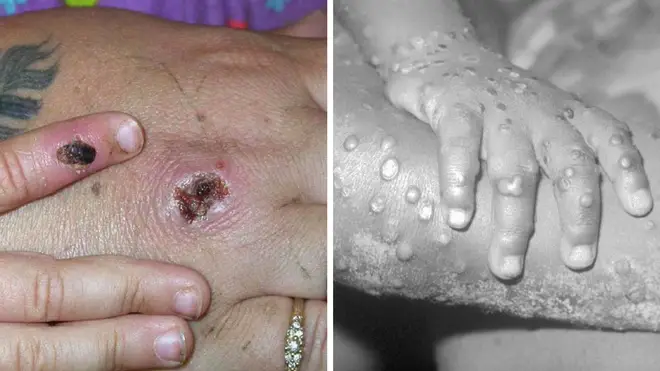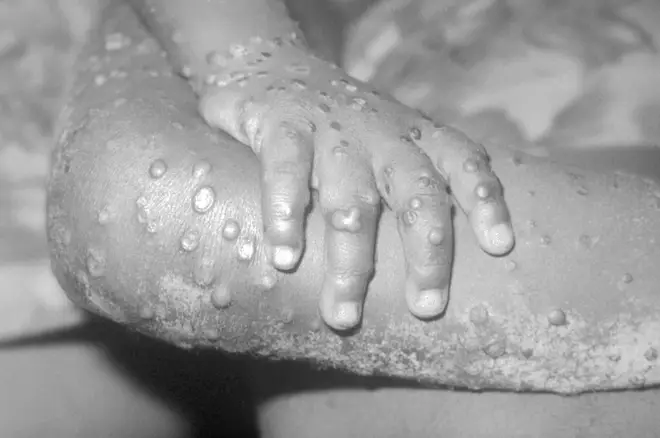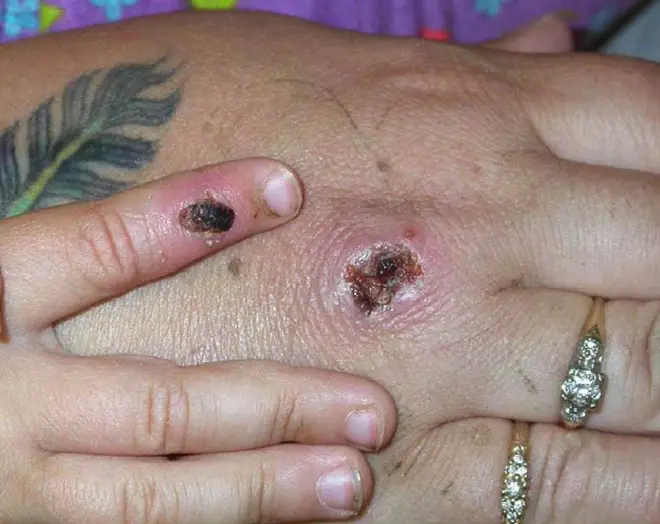
Clive Bull 1am - 4am
17 May 2022, 16:13

Monkeypox is likely to be sexually transmissible, experts believe, as four more cases of the virus have been identified in the UK.
Three new cases have been detected in London and one in the North East of England - bringing the total number of confirmed cases to seven, health bosses have said.
The UK Health Security Agency (UKHSA) said all four of the most recent cases self-identify as gay or bisexual men.
People from these groups are being asked "to be alert" to possible symptoms, such as rashes or lesions on any part of their body, especially their genitalia.
The outbreak of cases in the UK has led to some sexual health clinics reintroducing social distancing measures and even asking patients about any unusual bumps or rashes ahead of their appointment.
The monkeypox rash, which can develop as part of the virus, changes and goes through different stages before finally forming a scab, which later falls off.
The UKHSA also said that initial symptoms of monkeypox include fever, headache, muscle aches, backache, swollen lymph nodes, chills and exhaustion.
Read more: Rare case of monkeypox confirmed in England as patient treated in isolation unit
Read more: Two cases of rare monkeypox confirmed in London

Previously, it was believed the virus could only spread by close contact such as contact with lesions or via an infected person's exhaled respiratory droplets.
But emerging evidence indicates the virus could also be spread during sexual intercourse.
Sexual health clinics have reintroduced social distancing amid fears about rising cases, with at least one practice in west London bringing in stricter measures, the Mail Online reports.
Patients at the practice were reportedly told to keep a one-metre distance in the waiting room and were asked if they had any unusual bumps or rashes prior to each appointment.
The UKHSA is working to find links between the latest four monkeypox cases, which all appear to have been infected in the capital, with common contacts established between two of the four individuals.
Those who need care are being treated in special isolation units at the Royal Free Hospital, Royal Victoria Infirmary in Newcastle upon Tyne and Guy's and St Thomas'.
The four new cases do not seem to be connected to the previous confirmed cases of monkeypox in the UK - leading to fears there has been transmission in the community.
The first case was announced on May 7, after the patient returned to the UK from Nigeria.
Read more: Coleen's Wagatha Christie dossier as full texts and posts revealed in court
Read more: Liz Truss sets out bombshell plans to tear up Northern Ireland post-Brexit deal

Two further cases were announced on May 14 and were not linked to the first case. The pair live together in the same household.
Due to the recent outbreak, and uncertainties around how some of the individuals acquired their infection, the UKHSA is working closely with NHS partners to establish whether there have been any more cases in recent weeks, and international partners to examine whether other countries have seen a similar rise in monkeypox.
Dr Susan Hopkins, chief medical adviser at the UKHSA said: "This is rare and unusual.
"UKHSA is rapidly investigating the source of these infections because the evidence suggests that there may be transmission of the monkeypox virus in the community, spread by close contact.
"We are particularly urging men who are gay and bisexual to be aware of any unusual rashes or lesions and to contact a sexual health service without delay.
"We are contacting any potential close contacts of the cases to provide health information and advice."
The health agency emphasises that the virus does not spread easily between people and the risk to the UK population is low.